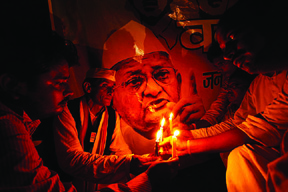The snobbery of intellectual writers and insensitivity of the political class comes as a shame at this defining moment in our country’s history. Let’s show some respect to this mass awakening, so essential for a vibrant democracy and a pro-active citizenry, appeals Vinita Deshmukh.
Propagators of mass hysteria and mobocracy have one thing in common-they refuse to get out of their mindset and understand the new wave of mass participation, so essential for a vibrant democracy, that is now sweeping across the country. They have to realise that the printed word in newspapers or the debates on TV channels, are not longer bible truths for people, who have begun to examine the facts and reject untruth. This is evident from the comments on articles about the movement available through a random check on the Internet.
 Clearly, the ruling political and intellectual class (at least most of it) is in disconnect with people’s sentiments and the untiring efforts being made to get the government to work for the people and not for a privileged few. In fact, these privileged classes have themselves completely forgotten the fundamentals of governance in a democracy-first, information dissemination and second, participation in governance,
Clearly, the ruling political and intellectual class (at least most of it) is in disconnect with people’s sentiments and the untiring efforts being made to get the government to work for the people and not for a privileged few. In fact, these privileged classes have themselves completely forgotten the fundamentals of governance in a democracy-first, information dissemination and second, participation in governance,
Everyone need not know every detail of the Bill like a scholar, academician or an activist would, but they have sensed that the government was trying to push down the throats of millions of people, an absolutely weak and draconian bill that would ultimately protect the corrupt. This attempt by the government to try and fool the people and numb them into submission, should have been reason enough for intellectual writers, newspaper editors and activists across the country, no matter what their differences over the alternative Jan Lokpal Bill, to unite and pull up the government over its sinister plan. Or, they ought to have tried to work out ways to strengthen the Lokpal Bill with a sense of urgency since the issue came into the public domain instead of criticisms and new drafts that have come a bit late in the
day. This is no time for prolonged debates anymore-the nation is outraged; what is necessary is swift action.
The government says it requires time-an excuse that has been supported by several high-profile columnists. Don’t they realize the uniqueness of the situation, when lakhs of people have come out onto the streets in the cities, towns and villages, to peacefully agitate, and many more are supporting the movement from their homes and share this spirit in their hearts. It’s an extraordinary situation, when citizens in such massive numbers are demanding a quick decision. If something extraordinary came up in our day-to-day lives, say a marriage that is to be organised within 48
hours as the bridegroom has to return to his job abroad, or a lucrative project that has been awarded with a challenging deadline, what would we do? Obviously, we would work round-the-clock, if this is necessary, to complete
the task. Is the government so insensitive, so callous, as to not be able to work 20 hours a day if required, to debate and reach a conclusion during the ongoing parliament session itself? It is outrageous that ministers continue to buy time when all that the protestors are peacefully and humbly saying is “please do it with immediate effect”. Even Lord Meghnad Desai told a television channel that the issue could be debated and decided in 60 hours.
By criticising the movement at this defining moment in the country’s history, we are encouraging the government to close its eyes and ears to the foremost demand for a strong anti-corruption law, which is unarguably the urgent need of the hour. Anna might be a rustic villager and may not have studied law as Gandhiji did, but his knowledge of the laws by which our democracy functions is better than many of us who are educated. Hence, there is no dismissing him as some “instant saint” trying to play God or turn into a legend.
This is an example of a pro-active democracy and the powers that be and the celebrity columnists must see it in this new perspective, by dropping the conditioned mindset to look down on the “middle class fraternity” (one columnist had the gall of calling it the “chattering class”.) It is evident that Anna Hazare’s movement is cutting across many classes-whether it is the poor, the lower middle class, the upper middle class and now even the rich-are represented in the movement. It is the yearning of every Indian that corruption should be rooted out, and now. Why then are some
intellectuals playing into the hands of those who sow and breed corruption?
Having said this, one must admit that the film fraternity, barring a few exceptions, has shown sensitivity to the people’s sentiments and to Anna Hazare’s selfless crusade. It, too, is a privileged class in that sense, but it has heard the heartbeat of millions of Indians. It only goes to prove that if your heart is in the right place, you can read the pulse of the people. Otherwise, you are simply convenient spokespersons of scamsters who are a hindrance to the tremendous movement for change that we are witnessing now.
(Author is a senior editor, author and convener of *Pune MetroJagruti Abhiyaan*. She can be reached at vinitapune@gmail.com)






